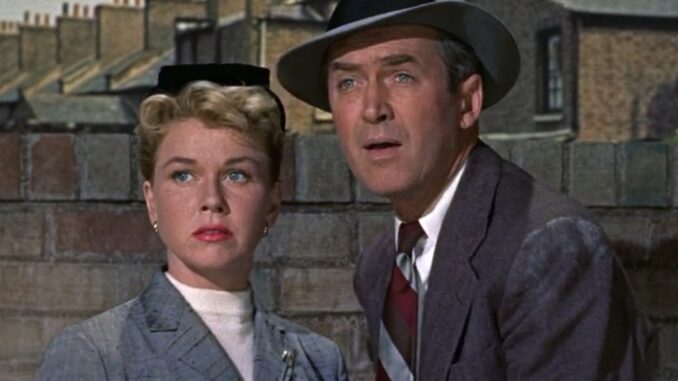
When it comes to timeless suspense and masterful storytelling, few directors have left a legacy as profound as Alfred Hitchcock. Among his many masterpieces, The Man Who Knew Too Much (1956) stands out—not just as a thrilling cinematic experience, but as a hallmark of mid-century Hollywood at its best. Starring James Stewart and Doris Day, this color remake of Hitchcock’s own 1934 British version is often hailed as one of his most emotionally resonant and visually arresting films.

A Family Vacation Turned International Nightmare
What begins as a serene family vacation in Morocco soon takes a sharp turn into chaos and conspiracy. Dr. Benjamin McKenna (James Stewart), his wife Jo (Doris Day), and their young son are American tourists enjoying the colorful culture of Marrakesh. But everything changes when they befriend a mysterious Frenchman—who later dies in Dr. McKenna’s arms after whispering a secret that will endanger their lives.
Before they can make sense of it, their son is kidnapped in a ploy to keep them silent. The McKennas are thrust into a race against time that leads them from the bustling streets of Marrakesh to the echoing halls of London’s Royal Albert Hall—all while attempting to prevent an international assassination.
The Power of Ordinary People in Extraordinary Circumstances
One of the most brilliant aspects of The Man Who Knew Too Much is its portrayal of average people forced into extraordinary events. Hitchcock loved using “everyman” protagonists, and James Stewart’s performance as a concerned father showcases this perfectly. Jo, portrayed by the legendary Doris Day, evolves from a passive tourist to a courageous mother using her voice—literally and figuratively—to save her child.

This theme of vulnerability and resilience struck a chord with American audiences in the 1950s, and continues to resonate today.
Suspense Through Precision: Hitchcock’s Craft at Its Peak
What makes this Hitchcock film so compelling is not just the storyline—it’s how that story is told. The famous scene in Royal Albert Hall is a masterclass in cinematic tension. For over 10 minutes, there is almost no dialogue. Just the music. The camera. The ticking clock.
Hitchcock uses visual storytelling to perfection. As the orchestra swells and the cymbals are about to crash—signaling the moment of the planned assassination—Jo’s scream pierces the silence, changing everything. This scene is not only iconic but showcases why Hitchcock is often referred to as the Master of Suspense.
“Que Sera, Sera” – More Than Just a Song
Another element that helped the film connect with viewers was its music—particularly the Oscar-winning song “Que Sera, Sera (Whatever Will Be, Will Be)” performed by Doris Day. Originally written for this movie, the song became a cultural phenomenon and is still widely recognized today.
Within the context of the film, it serves as more than just a tune. It becomes a signal, a lifeline, and a message of hope. It’s a rare example of a film song that carries actual plot weight—something rarely achieved with such emotional power.
Why This Remake Works
Yes, The Man Who Knew Too Much (1956) is a remake—but it’s a rare case where the director remakes his own film, and does it better the second time around. While the original 1934 version was tight and compelling, the 1956 version is broader, deeper, and more emotionally rich.
By shifting the story to include a family dynamic and drawing from real-world geopolitics, Hitchcock adds complexity. And with stars like James Stewart and Doris Day, the performances are more nuanced and relatable for a post-war American audience.
The Hitchcock Touch: Cameos, Symbols, and Layers
Hitchcock’s signature style is on full display here—from his brief cameo in the market in Marrakesh to his symbolic use of space and color. He plays with shadows, silence, and sight lines in ways that keep the viewer unsettled and fully engaged.

It’s not just a movie about a kidnapping—it’s a movie about knowledge, control, and the limits of power. Who knows too much? Who knows too little? And what happens when truth is both a weapon and a curse?
Lasting Legacy and Cultural Impact
More than six decades after its release, The Man Who Knew Too Much remains a staple in discussions of classic American cinema. It’s often taught in film schools for its structure, suspense, and innovative techniques.
Moreover, its themes—of family, sacrifice, and international intrigue—continue to echo in today’s geopolitical climate. In many ways, the film was ahead of its time, blending personal stakes with political tension long before such hybrids became common in Hollywood.
Final Thoughts: A Must-Watch for Film Lovers
If you’re diving into the world of Alfred Hitchcock, The Man Who Knew Too Much is essential viewing. It embodies everything that makes Hitchcock great: layered storytelling, unforgettable visuals, and psychological depth.
Whether you’re a cinephile, a suspense lover, or just someone looking for a film that stands the test of time, this is one of the best Hitchcock films you can experience.
So next time you’re wondering, “What classic movie should I watch tonight?” — cue up The Man Who Knew Too Much and witness how a family vacation becomes a global race against fate.
